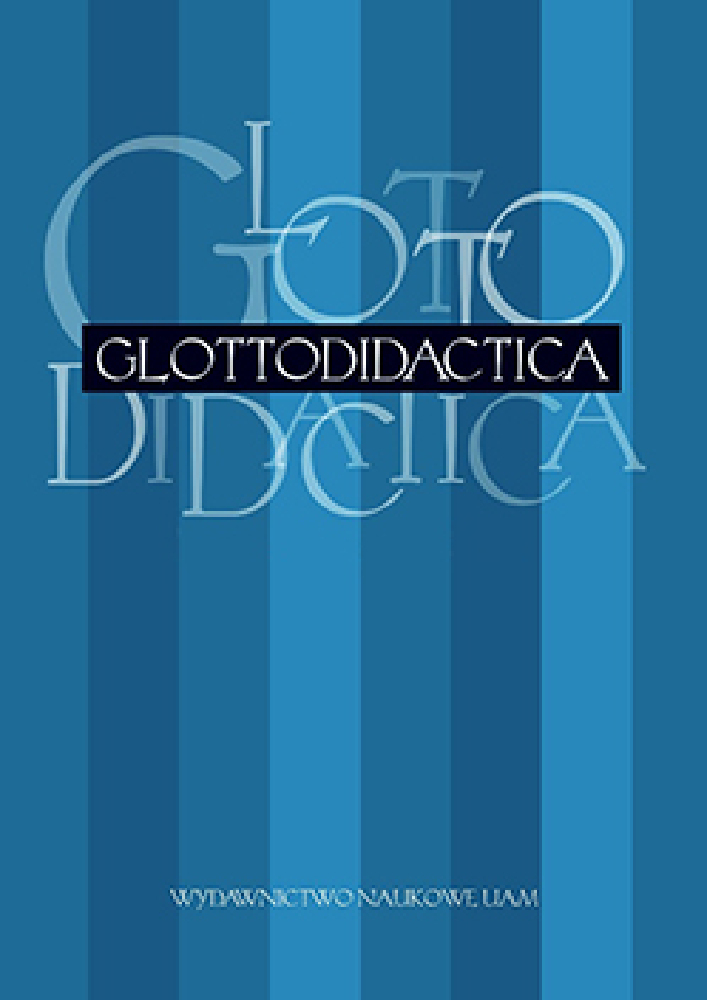Abstract
According to F. Grucza’s anthropocentric conception of language, learning a foreign language consists in the acquisition and reconstruction of linguistic knowledge by learners, therefore nobody can be taught a language. Relations between languages can take the form of interrelations or transrelations. Does the prestige of a particular language influence the motivation or demotivation for learning it? Which perspective (inter- or trans-) is adopted nowadays in Poland for teaching German as a foreign language?Literaturhinweise
Bonacchi, S., 2011. Höflichkeitsausdrücke und anthropozentrische Linguistik. Serie: Języki. Kultury. Teksty. Wiedza. (Grucza, S. / Tylusińska-Kowalska A. (Hrsg.), Warszawa: Euro-Edukacja.
Götze L. 2010. Strukturdebatte des Deutschen als Fremd- und Zweitsprache. Rückblick und Ausblick. In: DaF 4, 222–228.
Grucza F., 1988. Zum Begriff der Sprachkompetenz, Kommunikationskompetenz und Kulturkompetenz. In: Honsza N. /Roloff H.G. (Hrsg.), Daß eine Nation die andere verstehen möge. Festschrift für M. Szyrocki zu seinem 60. Geburtstag. Amsterdam, 309–331.
Grucza F. 1989. Język a kultura, bilingwizm a bikulturyzm: lingwistyczne i glottodydaktyczne aspekty interlingwalnych i interkulturowych różnic oraz zbieżności. In: Grucza F. (Hrsg.), Bilingwizm, bikulturyzm, implikacje glottodydaktyczne. Warszawa: UW, 9–49.
Grucza F., 1993. Zagadnienia ontologii lingwistycznej. O językach ludzkich i ich (rzeczywistym) istnieniu. In: Bartmiński J. (Hrsg.), Opuscula Logopedica in honorem Leonis Kaczmarek, Lublin: UMCS, 25–47.
Grucza F., 1997. Języki ludzkie a wyrażenia językowe, wiedza a informacja, mózg a umysł ludzki. In: Grucza F. / Dakowska M. (Hrsg.), Podejście kognitywne w lingwistyce, translatoryce i glottodydaktyce. Warszawa: UW, 7–21.
Grucza F., 2006. Glottodydaktyka: nauka – praca naukowa – wiedza. In: Przegląd Glottodydaktyczny 20. Warszawa: KJS, 5–26.
Grucza F., 2007a. Was kann die Linguistik leisten? Wozu angewandte Linguistik? In: Grucza, F. / Lukszyn, J. (Hrsg.), Lingwistyka stosowana. Historia – zadania – osiągnięcia. Warszawa: Euro- Edukacja, 371–383.
Grucza F., 2007b. Über den Status der Angewandten Linguistik. In: Grucza, F. / Lukszyn, J. (Hrsg.), Lingwistyka stosowana. Historia – zadania – osiągnięcia. Warszawa: Euro-Edukacja. 349–370.
Grucza F., 2011. Lingwistyka i kulturologia antropocentryczna: Co łączy, co dzieli te dziedziny? W druku.
Grucza S., 2000. Kommunikative Adäquatheit glottodidaktischer Texte – zur Kritik des sog. Authentizitätspostulats. Adekwatność komunikacyjna tekstów glottodydaktycznych – krytyka tzw. postulatu autentyczności. In: Niemiecki w Dialogu./ Deutsch im Dialog 2/1, 73–103.
Kleppin K., 2004. Mehrsprachigkeitsdidaktik = Tertiärsprachendidaktik? Zur Verantwortung jeglichen (Fremd-)Sprachenunterrichts für ein Konzept von Mehrsprachigkeit. In: Bausch K.-R. et al. (Hrsg.), Arbeitspapiere der 24. Frühlingskonferenz zur Erforschung des Fremdsprachenunterrichts. Tübingen, 88–95.
Lewicka G., 2007. Glottodydaktyczne aspekty akwizycji języka drugiego a konstruktywistyczna teoria uczenia się. Wrocław: ATUT.
Olpińska M., 2009. Nauczanie dwujęzyczne w świetle badań i koncepcji glottodydaktycznych, Warszawa: Euro-Edukacja.
Puppel S., 2007. Interlingwalizm czy translingwalizm? Interkomunikacja czy trans komunikacja? Uwagi w kontekście współistnienia języków naturalnych w ramach globalnej wspólnoty kulturowo-językowo-komunikacyjnej. In: Puppel, S. (Hrsg.), Społeczeństwo – kultura – język. W stronę interakcyjnej architektury komunikacji. 79–94.
Roche J., 2008. Fremdsprachenerwerb. Fremdsprachendidaktik. Tübingen und Basel: A. Francke.
Watzlawick P., 2003. Kurztherapie und Wirklichkeit. München: Piper Verlag.
Wiertlewska J., 2010. W stronę nowego paradygmatu nauczania języka angielskiego w polskiej szkole w triadzie: język ojczysty – język globalny – drugi język obcy. Podejście ekolingwistyczne. (unveröffentlichte Dissertation)
Zabrocki L., 1966. Kodematische Grundlagen der Theorie des Fremdsprachenunterrichts. In: Glottodidactica 1, s. 3–42.
Zabrocki L., 1975. Kybernetische Modelle der sprachlichen Kommunikation. Wrocław – Warszawa – Kraków.
Lizenz
Authors
Authors of texts accepted for publication in Glottodidactica are required to complete, sign and return to the editor's office the Agreement for granting a royalty-free license to works with a commitment to grant a CC sub-license.
Under the agreement, the authors of texts published in Glottodidactica grant the Adam Mickiewicz University in Poznań a non-exclusive, royalty-free license and authorize the use of Attribution-NoDerivatives 4.0 International (CC BY-ND 4.0) Creative Commons sub-license.
The authors retain the right to continue the free disposal of the work.
Users
Interested Internet users are entitled to use works published in Glottodidactica since 2016, under the following conditions:
- attribution - obligation to provide, together with the distributed work, information about the authorship, title, source (link to the original work, DOI) and the license itself.
- no derivatives - the work must be preserved in its original form, without the author's consent it is not possible to distribute the modified work, such as translations, publications, etc.
Copyrights are reserved for all texts published before 2016.
Miscellaneous
Adam Mickiewicz University in Poznań retains the right to magazines as a whole (layout, graphic form, title, cover design, logo etc.).




